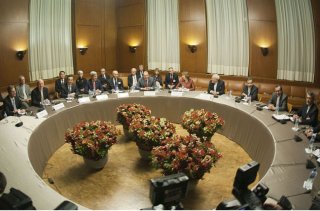Iran Nuclear Deal: Why Washington Shouldn't Settle
The international community must not be drawn into the false sense of complacency that any deal with Iran is better than no deal.
Finally, it must be stressed that the implications of a bad deal with Iran are dire: for Israel, for the Middle East, and for the world. It will also have a devastating impact on the NPT regime. Although some element of compromise will be part of any deal, in this negotiation, the major onus is on Iran, due to its violation of the NPT. The main objective of the P5+1—namely, not to enable Iran to remain in threshold status (which could lead to nuclear weapons status)—cannot be compromised. The international community must not be drawn into the false sense of complacency that any deal with Iran is better than the alternative. It’s not. Legitimizing a bad situation through a deal with Iran that does not go a great distance toward eliminating the emerging nuclear threat is the worst possible outcome. All of the determination that the international community has mustered over the past decade would be squandered, and Iran would come out the smiling winner.
Emily B. Landau is Head of the Arms Control Program at the Institute for National Security Studies (INSS), at Tel Aviv University and the author of“Decade of Diplomacy: Negotiations with Iran and North Korea and the Future of Nuclear Nonproliferation.”
Amb. Shimon Stein is a Senior Research Fellow at INSS and a former deputy director general of Israel’s Foreign Ministry, and ambassador to Germany.

